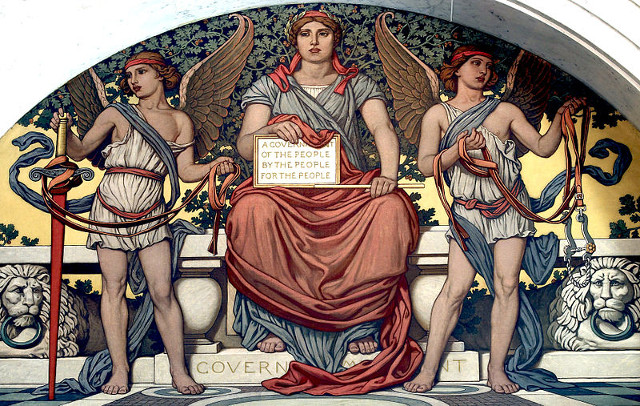Got Choices?

The Economy
In modern discourse, we refer to “the economy” as though we all know exactly what we are talking about. For example, we may say the economy is doing well, or it is doing badly. But what does this really mean?
Politicians like to have a measure of how good things are so they can brag to their constituents and, hopefully, get re-elected. So, with the help of economists, they have come up with a number of different measurements. Likely you have heard talk of the Gross Domestic Product, or GDP. You may also be interested to watch the unemployment rate, the poverty rate, or the foreign trade deficit. All these are different ways to measure the ways people are interacting and trading with each other.
But in many instances, our leaders may be measuring things that don’t really make our lives that much better. For example, a low unemployment rate might show fewer people have lost their jobs. But it doesn’t tell anything about the quality or income levels of the jobs people do have. And with more recent ways of reporting, it also may have nothing to say about the number of people who could be in productive jobs, but choose not to.
Other traditional indicators of a “good economy” might be good news for people who operate banks, or trade stocks on Wall Street. But they might not mean much to people who work in manufacturing jobs or the service sector. For example, a government stimulus bill might be great news for big corporations who sell to the government. But an economy made “good” by such actions might not be good for those who have to go to work every day to pay the taxes necessary to service an ever-increasing debt.
In most instances, when we talk about the size of an economy, we are talking about the GDP, or Gross Domestic Product mentioned above. This is meant to compute the total of all goods and services which have been produced in a given period of time.
If you think back to our discussion on accounting, you should note this is a kind of “income statement” notion. In other words, it is a measure of things that transacted, in and out, over a period of time.
It is not at all a “balance sheet” kind of notion. Balance sheets talk about the total wealth or value someone has accumulated. And it counts good things as assets and bad things as liabilities–rendering a net, or total resulting value.
GDP is essentially a measure of how much total goods and services everyone sold for the year–not the total of assets everyone is left with to enjoy. True, we can infer certain things about our balance sheet from our income statement, if we are careful. For example, we might assume if we sold something, someone bought it. And if someone bought it, they must have enjoyed it so life was good. But these inferences are not always valid as we shall see.
The GDP is meant to be a measure of total production, or how many things we created, produced and sold. Unfortunately, that is not really what we measure directly. As it turns out, it is pretty hard to figure out exactly what everyone produced. It is much easier to first figure out what we spent and then assume it was all spent buying something we also produced.
But what we spend includes purchases that are worthwhile and it also includes purchases that are not so worthwhile. In particular, government spending is included in GDP calculations regardless of whether it is spent on:
- A key infrastructure that helps improve quality of life and productivity for everyone,
- A subsidy for a new company that will soon go out of business,
- An interest payment on an ever-increasing Federal debt,
- A payment to a farmer in exchange for his agreeing not to grow anything on his land.
Regardless, all that spending is counted into the GDP. So it is really a measure of our spending–not our productivity. And it is definitely not a measure of our total accumulated wealth as a balance sheet would show.
Imagine you applied this kind of scoring to your own personal finances.
Right now there are probably certain factors you consider when deciding how well you are doing financially. For example, you might consider how much income you make each year, or on each paycheck. This is an income statement approach. If you feel like you have the money you need each week to buy the things you want to live comfortably, you may feel like you are doing pretty well.
If you are a little more sophisticated, you might even have a balance sheet of one form or another, showing the assets you own and the liabilities you still owe. Each year, you might look to see if your wealth has increased or decreased. If your possessions are staying the same or growing, you might feel like you are on the right track. Otherwise, you may need to make some adjustments somewhere. Either you need to start earning more or you need to start spending less.
But if you scored your personal finances like the government does, you would not be measuring your total balance sheet wealth at all. You wouldn’t even be paying attention to how much you were earning. Rather, you would only be focused on the expense section of your income statement, hoping to maximize how much you spend each year.
For example, maybe you normally spend about $60,000 in a year. Imagine how well off you could be if only you spent $80,000! You could get some new credit cards or maybe take out a second mortgage on your house. And it might not even matter so much what you spent the money on–the goal is simply to spend.
Maybe you should talk to the person who mows your lawn and ask him to bring 10 friends over to work with him next time. It wouldn’t really matter if they accomplished anything–you could just pay them anyway. When you do things the government way, the more you spend, the better your life will be and that is good and important to you.
If you spent the extra $20,000 on things that did you no good, obviously that would not be helping you out much (although it would be great for the landscaper and his friends). But even if you spent it on things that really made your life better, the problem is the debt you are accumulating. What if the combination of the credit card debt and the additional debt on your house were too much to pay each month? For a short time, you might be able to borrow on other assets to cover the payments. But eventually you would run out of assets and money. And then you would lose everything.
When we focus only on spending as a measure of economic health, our circumstances end up worse in the end. Even if we don’t lose everything, we sometimes end up with so much debt that a large part of our productivity is consumed in paying interest to a wealthy bank. This leaves less of our work available to pay for the things we really value.
It is easy to become a servant to people who are much wiser and wealthier. It has been said:
Those who understand interest, earn it. Those who don’t, pay it.
Unfortunately, our politicians and leaders have become accustomed to measuring GDP. An increasing GDP means “the economy” is growing or we are in an “expansion”. A decreasing GDP means it is shrinking or we are in a “recession.”
But the GDP can be manipulated simply by spending more money. This can be money the government spends directly, or it can be money the government encourages people to spend over and above what they might otherwise choose to spend. So GDP can be stimulated by increasing government debt or private debt.
GDP can even be increased by forcing banks to lend to people who wouldn’t otherwise qualify for a loan. In the short term, this stimulates the housing market, gives construction workers more work to do, and causes more money to flow around for a while. But with each step, the liabilities on the “national balance sheet” grow at a faster pace than the assets. And the net wealth or prosperity of the people continually decreases.
Things may get worse gradually, or they may appear great while gradually eroding on the inside. But eventually, a crash will come and bring the whole economy tumbling down.
This doesn’t mean GDP is necessarily a bad thing. It just means we should not manipulate it by artificial borrowing and spending, which is a bad thing. Of course, it is important to have a strong and robust GDP. When people are actively engaged in producing and consuming the things they want and need in order to have happy and fulfilled lives, this is a good thing.
But the GDP doesn’t have to be increasing every year in order for people to live successful and prosperous lives. Rather the GDP, like most things in complex, living systems, is a part of a very large and sophisticated negative feedback process. In other words, left alone, it will regulate itself around some natural set point. Just like the temperature in your house, we should expect small fluctuations up and down as a normal part of this regulating process. But in balance, it will find its correct level.
So what is the “correct” size for the national GDP? It is the sum of all the production necessary to satisfy the wants and needs of free people who are paying natural market prices for whatever goods and services they can afford using the productivity of their own labors.
Certainly if the population is increasing, we would expect to see GDP increase as a result of the production and consumption of the additional people. And if people choose to work harder and develop ways to produce more of the things they want and need to increase their standard of living, GDP should also be affected.
But when the changes we are measuring are caused by an artificial stimulus such as forced borrowing and spending, or if the very unit of measure (the dollar) is a moving target due to inflation, perhaps we should look for a better measurement to evaluate the effectiveness of our leaders and their economic policies.
